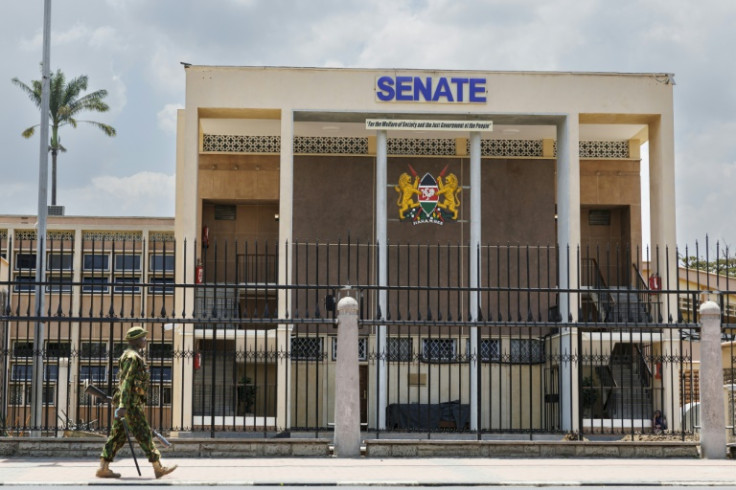
Kenya's upper house of parliament is set to vote Thursday on whether to remove Deputy President Rigathi Gachagua from office in an unprecedented political saga that has gripped the nation.
The Senate will give its verdict at the end of the second day of an impeachment trial against the embattled number two to President William Ruto.
It follows a historic vote last week in the lower house, the National Assembly, to impeach Gachagua on 11 charges including corruption, insubordination, undermining the government and practising ethnically divisive politics.
A trial in the Senate began Wednesday after the 59-year-old, also known as "Riggy G", failed in multiple court bids to halt the process.
The outspoken politican arrived at parliament on Thursday, shortly before the session opened, and is expected to testify in his defence later.
Gachagua has denied all the charges -- and no criminal proceedings have been launched against him -- but he will automatically be removed from office if the Senate approves his impeachment.
If this happens, he would be the first deputy president to be ousted in this manner since impeachment was introduced in Kenya's revised 2010 constitution.
Gachagua, who has protested that he is being treated like a "spent cartridge", can however fight the impeachment in the courts once the parliamentary process is completed.
Among the names of possible successors floated by the Kenyan media are Interior Minister Kithure Kindiki, Foreign Minister and Prime Cabinet Secretary Musalia Mudavadi and a county governor, Anne Waiguru.
Gachagua's chances of survival are slim if opposition members in the 67-seat Senate back the ruling party as witnessed in the National Assembly vote on October 9.
Unlike the process in the lower house, where MPs delivered their verdict on the entire motion, senators need to back just one charge, by at least two-thirds of the votes, for the impeachment to succeed.
An overwhelming 282 MPs in the 349-member assembly had overwhelmingly voted to impeach Gachagua, well over the more than two-thirds required.
A powerful businessman from Kenya's biggest tribe, the Kikuyu, Gachagua weathered previous corruption scandals to become deputy leader as Ruto's running mate in the closely fought 2022 election.
But in recent weeks, he has complained of being sidelined by the president, while also being accused of supporting youth-led anti-government protests that broke out in June.
Political tensions have been running high since the sometimes deadly demonstrations erupted over unpopular tax hikes, exposing divisions in the top echelons of power.
At a media briefing ahead of last week's vote, Gachagua vehemently rejected what he called "nonsensical allegations" and said the efforts to oust him disregarded the will of the Kenyan people in 2022.
"This is what we call political deceit, conmanship and betrayal."
Addressing churchgoers in his stronghold of central Kenya on Sunday, Gachagua nevertheless called for his supporters to remain calm.
"Let's preach and maintain peace irrespective of the outcome. Kenya is our country," he said.
His lawyers have argued that the impeachment process was unfair and fast-tracked. But in the latest of numerous rulings, a High Court decided Wednesday against suspending the entire process, clearing the way for the Senate hearings to proceed.
Ruto has not given any public comment on the impeachment, but Gachagua has said the process could not have gone ahead without his boss's blessing.








